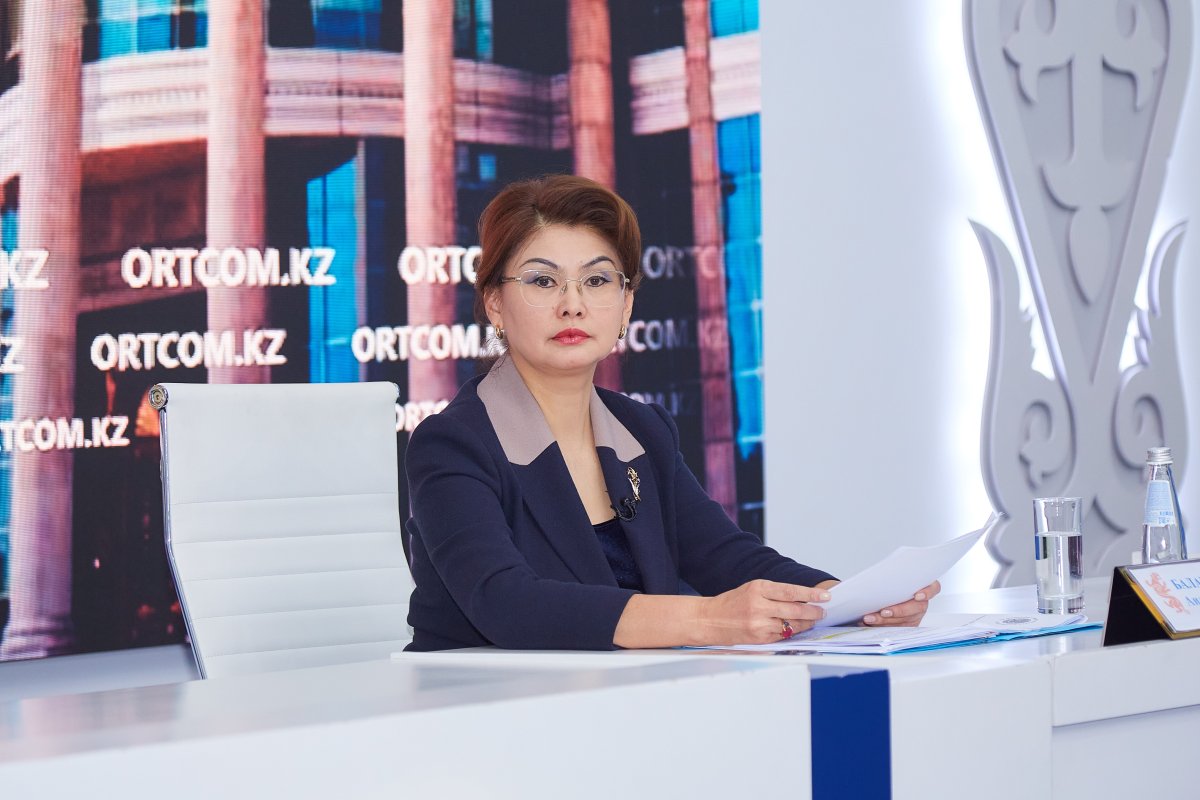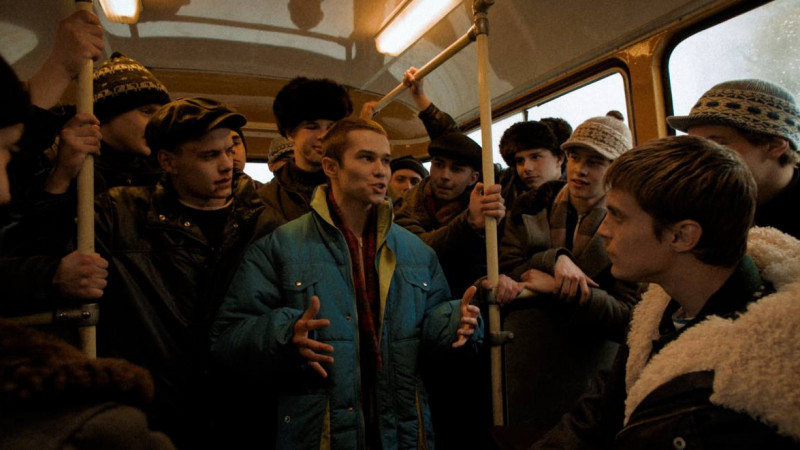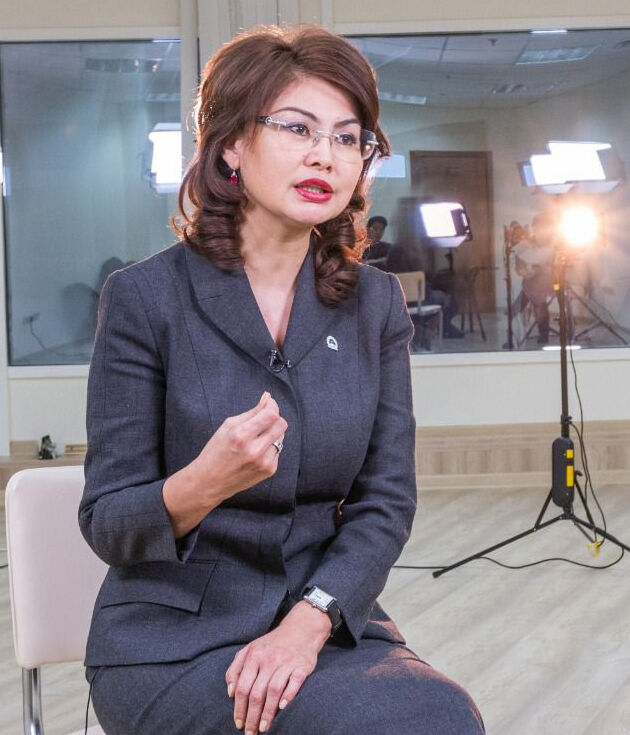ASTANA – Kazakh Minister of Culture and Information Aida Balayeva highlighted the key results of the ministry’s activities for this year at a Dec. 26 press briefing in the Central Communications Service (CCS), reported CCS.

Minister Balayeva at a Dec. 26 press briefing. Photo credit: ortcom.kz.
Balayeva underlined the three major aspects of the ministry’s information work – creating conditions for the media development, informing the population about the implementation of state policy, and ensuring information security.
The draft law on mass media
In March, President Kassym-Jomart Tokayev approved the Information doctrine aimed at ensuring freedom of speech, increasing the competitiveness of the domestic media, and strengthening information sovereignty. The government issued a respective decree for its implementation.

The Russian TV series “Slovo Patsana” by Zhora Kryzhovnikov. Photo credit: tengirnews.com.
Kazakhstan has developed a draft law on mass media, which was approved in the first reading of Mazhilis, the lower chamber of the Kazakh Parliament on Nov. 30. Overall, deputies introduced 114 amendments. The working group continues to hold discussions.
The draft law introduces the press card, a new feature for Kazakh journalists to facilitate accreditation. Yet it is too early to speak about methods, which will be used to simplify the procedures, according to the minister.
Online platforms and online advertising
On July 10, the head of state signed the law on online platforms and online advertising. It came into force on Sept. 10.

Kazakh filmmaker Aisultan Seitov won Best Director Award at the 25th Shanghai International Film Festival. His debut movie “QASH” (Run) tells the story of the tragic Kazakh famine as a result of the Soviet collectivization campaign in the 1930s. Photo credit: Qara Production.
Key innovations of the law include the obligation of online platforms to translate their interface into Kazakh language, improve personal data protection, review user complaints, moderate online content. It also clarifies rights and obligations of online users and influencers.
“Special attention was paid to the need for labeling ads by users posting advertising content. These rules have already passed the regulatory impact analysis and will be adopted by the end of February next year. They apply to users of online platforms who post commercial content,” said Balayeva.
The law also provides for administrative liability for the dissemination of false information. “This is a fine from 20 to 100 monthly calculation index (MCI) [US$150 – 750]. In case of repeated violations during the year – administrative arrest for 10 days. This norm is already at work,” she added.
Youth empowerment
The transformative power of youth-led initiatives continues to reshape state governance. Kazakhstan has a predominantly young population, with youth comprising 30% of its total inhabitants. Data from the Bureau of National Statistics indicates that the average age of a Kazakh citizen is 32 years.

Screenshot from the action film “Berkut.” Photo credit: kz.kursiv.media.
Conceptual amendments to the law on the state youth policy were also adopted this year. It was decided to extend the age of youth to 35 years. As a result, the young population requiring government support measures has expanded from 3.7 million people to 5.7 million people.
In 2023, Kazakhstan presented the Youth Development Index (YDI) with a purpose to assess the effectiveness of the government’s work and identify gaps. The YDI indicators include education, health and well-being, employment, political engagement, civic participation, sports, leisure and access to infrastructure, and safety.
The concept of the state youth policy for 2023-2029 suggests strengthening work in seven areas, ranging from engaging with rural youth to fostering patriotic education.
In this regard, Balayeva noted the action plan for the implementation of the concept. It consists of 80 activities. As a result, 943,000 citizens have been employed, including 467,000 young people.
On top of that, the Otbasy Bank full-fledged development and support institution and Baiterek National Holding are now developing the new 9-20-25 program, which is expected to be launched next year with a focus on the young population.
New frontiers in creative industries
Kazakhstan continues to improve the legal environment for the development of the creative economy. The country pursues its cultural policy under the concept of creative industries development for 2021-2025. It was adopted to generate employment in technological and venture entrepreneurship with a focus on the younger generation.

Minister Balayeva’s interview with the Times newspaper. Photo credit: time.kz.
Minister Balayeva said the work is carried out in two directions.
The first encompasses organizational solutions. Kazakhstan has set the institutional framework for the development of the creative industries.
“The ministry has established a specialized department in its structure. Now we are working on creating the appropriate infrastructure: centers and hubs of creative industries in the regions, as well as the opening of Creative Hub International Center for Creative Industry, which is aimed to find and support talents, develop infrastructure, and promote the export and commercialization of products,” she said.
The second aspect is the draft law on the support and development of creative industries. It will be submitted to Mazhilis in January next year.
“It provides for legislative changes related to intellectual property, additional sites in cultural facilities for the formation of creative communities, educational training programs, tax preferences to representatives of creative industries, which will give a powerful impetus to the development of this industry,” said Balayeva.
Freedom of religion
The ministry’s activities also encompass social misunderstandings related to the freedom of religion.
There are three missions under the ministry’s purview – to promote secular values, preserve interreligious harmony, and prevent religious extremism. In this regard, the ministry conducts awareness-raising and rehabilitation work and counterpropaganda of religious extremism on the web.
“It is obvious that it is necessary to deal not with the consequences of problems in this area, but with the causes. Over 14,000 illegal materials promoting religious extremism and terrorism have been deleted and blocked. On social networks, more than 20,000 people have been withdrawn from religious radical groups,” the minister said.
The ministry also elaborated a draft concept for the development of state policy in the religious sphere for 2024-2028.
In her interview with the Time newspaper, Balayeva said that “international human rights organizations, foreign and domestic experts, representatives of religious associations and parliamentarians are making proposals to improve legislation in the field of religion, including on the prohibition of wearing items of clothing in public places that prevent face recognition.”
Speaking about admissibility of wearing hijabs in Kazakh schools, she underlined the importance of ensuring the freedom of religion.
“I firmly believe that religious clothing in schools is the imposition of religious beliefs on children by parents. Every person in our country should have the right to choose their religion independently and consciously,” she said.
An upsurge in the domestic media
The Kazakh film industry is on the rise. The domestic cinema, according to the minister, is experiencing an upsurge. The main priority is to increase the production of films in the Kazakh language.
Since 2019, the state has supported over 100 film projects totaling over 17 billion tenge (US$34 million) that include 47 feature films, 25 documentaries, 24 short films, and eight animated films.
In 2023, Kazakh producers released 18 movies with the state support and launched 19 new projects. The action film “Berkut” (Eagle) by Daniyar Ibragimov collected 256 million tenge (US$564,000) over the month.
The historical drama “Mirzhakyp. Oyan (Wake up), Kazakh!” has fueled Kazakh society’s interest in its nation’s history and eminent historical figures. The movie has rapidly gained traction since its debut on Sept. 21.
Kazakh film stories continue to conquer the global audience on international film festivals, including on sensitive topics, such as nuclear tests and women’s rights.

